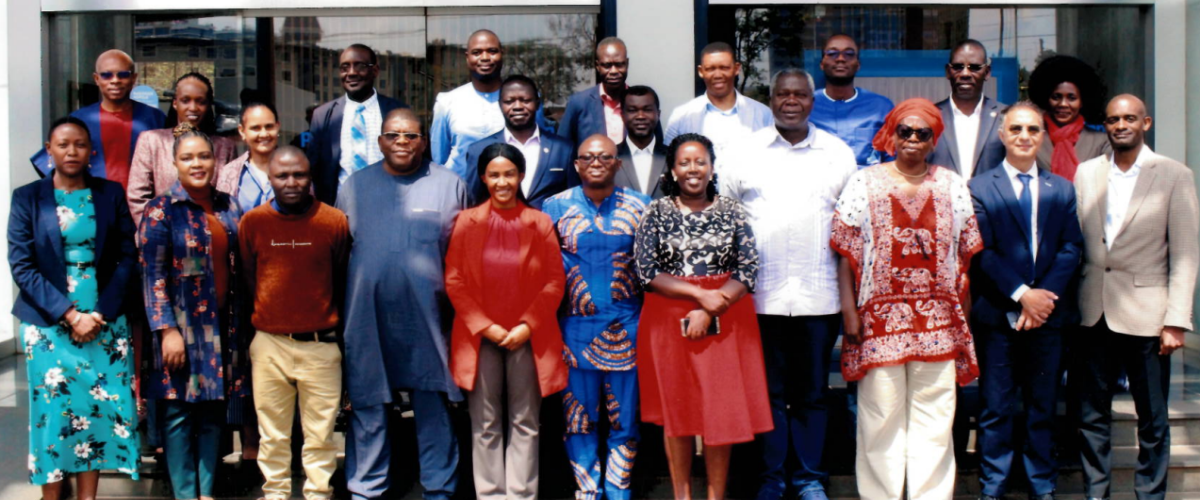
The CAADP-XP4 Consortium is co-implementing the CAADP Ex-Pillar 4 Project, which is financially supported by the European Union and administrated by IFAD for four years, 2019-2023. The Consortium held a meeting with the African Union Commission (AUC) from 1st to 2nd September 2022 at Park-Inn by Radisson in Nairobi, Kenya, to strengthen cooperation between these African agricultural research and development institutions with the African Union Commission.
The Consortium comprises the African Forum for Agricultural Advisory Services (AFAAS), the Association for Strengthening Agricultural Research in East and Central Africa (ASARECA), the Centre for Coordination of Agricultural Research and Development for Southern Africa (CCARDESA), West and Central African Council for Agricultural Research and Development (CORAF) and Forum for Agricultural Research in Africa (FARA).
The CAADP-XP4 Programme aims at strengthening the implementing organizations to collectively support African countries in delivering the program at hand and to contribute to the delivery of CAADP results through inclusive regional and international partnerships; production and exchange of climate-relevant agricultural knowledge; effective communication, monitoring and evaluation; promotion of systemic and effective use of science, knowledge and innovation; and representation of the sub-regional and National organizations at the continental level.
This meeting was necessitated by the Programme's alignment to the AU's Agenda 2063 and to the climate-relevant to CAADP and the Sustainable Development Goals that the AU is pursuing, and the need for these stakeholders to work together for better synergy and impact. The engagement with the African Union Commission was to discuss how to better mainstream the outcomes of the CAADP-XP4 Programme into the broader CAADP-Agenda through active involvement of the Consortium in the CAADP-BR process; and to set the basis for the AUC to provide further leadership to the interventions of the CAADP-XP4 Consortium in their steady efforts to allowing agricultural research and innovation, to drive impacts on the African economy.
The meeting participants from the CAADP-XP4 Consortium included Technical Committee (TC) members, the Monitoring and Evaluation team and the newly formed Gender Technical Working Groups. IFAD was represented by the Technical support specialist and the Programmes Support, M&E & Knowledge Management Officer. The African Union Commission was represented by the AUC Head of Division- Agriculture & Food Security, Knowledge Management Manager, M&E officer and AUC CAADP M&E Advisor.
Mr Moses Odeke, the TC Chairperson, officially welcomed the African Union Commission team and the IFAD team to the meeting. He said that CAADP-XP4 Consortium is open to possible collaboration in capacity strengthening, sensitizing countries on the BR process and implementation of the National Agricultural Investment Plans (NAIPs), among others.
Mr Amine Belhamissi, the Technical Specialist for ARD at IFAD, stressed that the European Union and IFAD want to see the CAADP-XP4 Consortium working closely with the AUC and was delighted with the steps taken by the two institutions.
Responding to the two speakers, Dr Simplice Nouala, AUC Head of Division- Agriculture & Food Security, intimated that the AUC could benefit significantly from the wealth of knowledge and research generated from the CAADP-XP4 Consortium and reiterated that an MoU was urgently required to guide this cooperation.
Following exchanges between the AUC and the Consortium on their ongoing activities related to the Malabo Declaration and agricultural research and development, brainstorming was undertaken to identify areas of collaboration. The identified broad areas of collaboration will be reflected in a memorandum of understanding (MoU) to be signed by the AUC and the Consortium. Key among the issues that were proposed for possible collaboration included the CAADP-XP4 Consortium being more involved in the design and implementation of various CAADP activities as well as providing technical backstopping and capacity strengthening of national stakeholders to be able to collect data needed for the CAADP Biennial Review process,
The two organizations agreed that the Consortium would also be fully involved in training Biennial Report (BR) data teams, including dissemination of BR data sensitization and awareness at the country level. Another area of collaboration was for the Consortium to support countries in terms of implementation and review of their National Agriculture Investment Plans (NAIPs).
The duo agreed to do joint resource mobilization, review the BR technical guidelines, and let the Consortium lead AU agricultural research and development-related initiatives, such as the soil health initiative.
The meeting was fruitful as both parties left content and committed to working together to change Africa's Agriculture Research and Development narrative.





